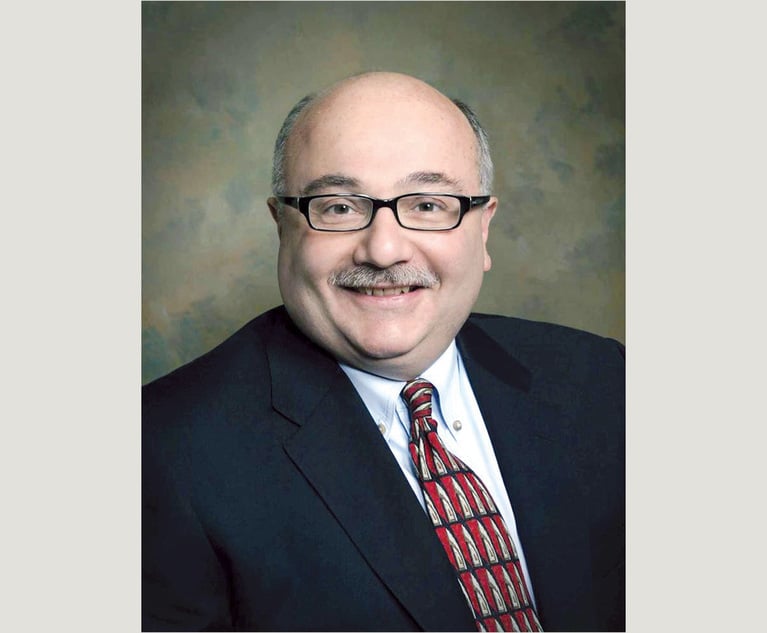 Michael J. Hutter. Courtesy photo
Michael J. Hutter. Courtesy photo Determining 'Molineux' Issues in Civil and Criminal Actions: A Suggested Approach
This column will set forth a suggested specific approach to determine the admissibility of uncharged crimes or bad acts of a party in either a civil or criminal action.
October 03, 2024 at 12:00 PM
12 minute read
The Court of Appeals in its 2023-2024 term reversed the criminal convictions of two well-known defendants, Sebastian Telfair, the former New York City high school basketball star and retired National Basketball Association player and Harvey Weinstein, the famed Hollywood film producer. Telfair had been convicted of the crime of criminal possession of a weapon in the second degree (Penal Law Section 265.03[5]) and Weinstein was convicted of first-degree criminal act (Penal Law Section 130.50[1] [repealed effective Sept. 1, 2024 – L. 2023, c. 771, Section 1]) and third-degree rape. (Penal Law Section 130.35[1]). Both convictions were reversed by a divided (4-3) Court of Appeals on the ground the trial judge in both cases erred as a matter of law in admitting evidence of alleged prior bad acts committed by Telfair, evidence involving Telfair's possession of a weapon and his conviction for weapon possession, and by Weinstein, testimony of four women detailing sexual assaults Weinstein allegedly committed against them. Admission of this evidence, the majority held, constituted a violation of New York's venerable Molineux rule. (People v. Telfair, 41 NY3d 107 [2023]; People v. Weinstein, 2024 NY Slip Op. 02222 [April 25, 2024]).
This column will not address specifically the merits of the court's rulings in these cases, something that has already been done by this author and others. (See Hutter, "Court of Appeals Evidence Decisions: A Potpourri of Rules for Criminal and Civil Actions, Part 2," NYLJ, Aug. 14, 2024, p. 3, col. 3 [collecting articles]). Rather, in light of the generally recognized difficulty in determining Molineux admissibility and the spirited dissents in Telfair and Weinstein, this column will set forth a suggested specific approach to determine the admissibility of uncharged crimes or bad acts of a party in either a civil or criminal action. The general approach set forth in Telfair and Weinstein will provide the framework for this approach, but it will be refined with the addition of separate inquiries drawn from prior Court of Appeals' Molineux decisions and referenced by both the majority and dissenters in Telfair and Weinstein. The suggested approach, it must also be noted, is one advocated by an eminent evidence scholar, Professor Clifford S. Fisman, who served as an assistant district attorney for several years in the Office of the Manhattan District Attorney under Robert Morgenthau before he joined the academy, in his book "Relevance, Character, Habit and Impeachment," (2023) (Carolina Academic Press).
NOT FOR REPRINT
© 2025 ALM Global, LLC, All Rights Reserved. Request academic re-use from www.copyright.com. All other uses, submit a request to [email protected]. For more information visit Asset & Logo Licensing.
You Might Like
View All
Decision of the Day: District Judge Vacates Magistrate's Ruling to Disqualify Prosecutors in Kidnapping Case


Decision of the Day: Judge Precludes Ballistics Expert's Opinion on Scene for 2016 Fatal Police Shooting
Trending Stories
- 1The 'Nonprofit Killer Bill': Separating Fear From Fact on HR 9495
- 2As U.S. Firms Gain Market Share, Freshfields Maintains Top Spot in European M&A Rankings
- 3People in the News—Jan. 13, 2025—McNees, Malamut Law
- 4How I Made Practice Group Chair: 'Collaboration Actually Makes the Job Fun,' Says Zachary Lerner of Troutman Pepper Locke
- 5LA-Area Law Firms Offer Support as Region Reckons With Raging Wildfires
Who Got The Work
Michael G. Bongiorno, Andrew Scott Dulberg and Elizabeth E. Driscoll from Wilmer Cutler Pickering Hale and Dorr have stepped in to represent Symbotic Inc., an A.I.-enabled technology platform that focuses on increasing supply chain efficiency, and other defendants in a pending shareholder derivative lawsuit. The case, filed Oct. 2 in Massachusetts District Court by the Brown Law Firm on behalf of Stephen Austen, accuses certain officers and directors of misleading investors in regard to Symbotic's potential for margin growth by failing to disclose that the company was not equipped to timely deploy its systems or manage expenses through project delays. The case, assigned to U.S. District Judge Nathaniel M. Gorton, is 1:24-cv-12522, Austen v. Cohen et al.
Who Got The Work
Edmund Polubinski and Marie Killmond of Davis Polk & Wardwell have entered appearances for data platform software development company MongoDB and other defendants in a pending shareholder derivative lawsuit. The action, filed Oct. 7 in New York Southern District Court by the Brown Law Firm, accuses the company's directors and/or officers of falsely expressing confidence in the company’s restructuring of its sales incentive plan and downplaying the severity of decreases in its upfront commitments. The case is 1:24-cv-07594, Roy v. Ittycheria et al.
Who Got The Work
Amy O. Bruchs and Kurt F. Ellison of Michael Best & Friedrich have entered appearances for Epic Systems Corp. in a pending employment discrimination lawsuit. The suit was filed Sept. 7 in Wisconsin Western District Court by Levine Eisberner LLC and Siri & Glimstad on behalf of a project manager who claims that he was wrongfully terminated after applying for a religious exemption to the defendant's COVID-19 vaccine mandate. The case, assigned to U.S. Magistrate Judge Anita Marie Boor, is 3:24-cv-00630, Secker, Nathan v. Epic Systems Corporation.
Who Got The Work
David X. Sullivan, Thomas J. Finn and Gregory A. Hall from McCarter & English have entered appearances for Sunrun Installation Services in a pending civil rights lawsuit. The complaint was filed Sept. 4 in Connecticut District Court by attorney Robert M. Berke on behalf of former employee George Edward Steins, who was arrested and charged with employing an unregistered home improvement salesperson. The complaint alleges that had Sunrun informed the Connecticut Department of Consumer Protection that the plaintiff's employment had ended in 2017 and that he no longer held Sunrun's home improvement contractor license, he would not have been hit with charges, which were dismissed in May 2024. The case, assigned to U.S. District Judge Jeffrey A. Meyer, is 3:24-cv-01423, Steins v. Sunrun, Inc. et al.
Who Got The Work
Greenberg Traurig shareholder Joshua L. Raskin has entered an appearance for boohoo.com UK Ltd. in a pending patent infringement lawsuit. The suit, filed Sept. 3 in Texas Eastern District Court by Rozier Hardt McDonough on behalf of Alto Dynamics, asserts five patents related to an online shopping platform. The case, assigned to U.S. District Judge Rodney Gilstrap, is 2:24-cv-00719, Alto Dynamics, LLC v. boohoo.com UK Limited.
Featured Firms
Law Offices of Gary Martin Hays & Associates, P.C.
(470) 294-1674
Law Offices of Mark E. Salomone
(857) 444-6468
Smith & Hassler
(713) 739-1250







